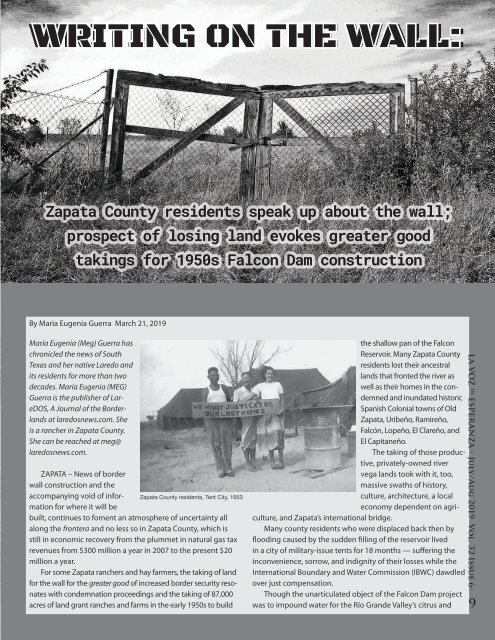La Voz - July Aug 2019
A National Emergency: To Protect & Preserve the Rio Grande by Melissa R. Cigarroa and Tricia Cortez • Traduire les Frontières/Translating Borders by Norma Cantú • (Our Lady of the Lake English/Creative Writing/Social Justice submissions: Prayer in the Shape of a Gun by s.t.shimi, The Noise of Highway 90 by Larissa Hernández, Rice by Emily Yglesias, Nuestro Westside by Samantha Ceballos • The Dungeons by Josefina Beatriz Longoria • Asylum by Arrie B. Porter) • WRITING ON THE WALL: Zapata County residents speak up about the wall; prospect of losing land evokes greater good takings for 1950s Falcon Dam construction by Maria Eugenia Guerra • Re-Rethinking Impeachment After the Mueller Report by Elliot Benjamin, Ph.D. • “The Status of Women in San Antonio”: An Overview Of The Report by Rogelio Sáenz and Lily Casura • Low Income Tenants Organizing For Justice by Pancho Valdez & James Hamilton
A National Emergency: To Protect & Preserve the Rio Grande by Melissa R. Cigarroa and Tricia Cortez • Traduire les Frontières/Translating Borders by Norma Cantú • (Our Lady of the Lake English/Creative Writing/Social Justice submissions: Prayer in the Shape of a Gun by s.t.shimi, The Noise of Highway 90 by Larissa Hernández, Rice by Emily Yglesias, Nuestro Westside by Samantha Ceballos • The Dungeons by Josefina Beatriz Longoria • Asylum by Arrie B. Porter) • WRITING ON THE WALL: Zapata County residents speak up about the wall; prospect of losing land evokes greater good takings for 1950s Falcon Dam construction by Maria Eugenia Guerra • Re-Rethinking Impeachment After the Mueller Report by Elliot Benjamin, Ph.D. • “The Status of Women in San Antonio”: An Overview Of The Report by Rogelio Sáenz and Lily Casura • Low Income Tenants Organizing For Justice by Pancho Valdez & James Hamilton
You also want an ePaper? Increase the reach of your titles
YUMPU automatically turns print PDFs into web optimized ePapers that Google loves.
WRITING ON THE WALL:<br />
Zapata County residents speak up about the wall;<br />
prospect of losing land evokes greater good<br />
takings for 1950s Falcon Dam construction<br />
By Maria Eugenia Guerra March 21, <strong>2019</strong><br />
María Eugenia (Meg) Guerra has<br />
chronicled the news of South<br />
Texas and her native <strong>La</strong>redo and<br />
its residents for more than two<br />
decades. María Eugenia (MEG)<br />
Guerra is the publisher of <strong>La</strong>reDOS,<br />
A Journal of the Borderlands<br />
at laredosnews.com. She<br />
is a rancher in Zapata County.<br />
She can be reached at meg@<br />
laredosnews.com.<br />
ZAPATA – News of border<br />
wall construction and the<br />
accompanying void of information<br />
for where it will be<br />
built, continues to foment an atmosphere of uncertainty all<br />
along the frontera and no less so in Zapata County, which is<br />
still in economic recovery from the plummet in natural gas tax<br />
revenues from $300 million a year in 2007 to the present $20<br />
million a year.<br />
For some Zapata ranchers and hay farmers, the taking of land<br />
for the wall for the greater good of increased border security resonates<br />
with condemnation proceedings and the taking of 87,000<br />
acres of land grant ranches and farms in the early 1950s to build<br />
Zapata County residents, Tent City, 1953<br />
the shallow pan of the Falcon<br />
Reservoir. Many Zapata County<br />
residents lost their ancestral<br />
lands that fronted the river as<br />
well as their homes in the condemned<br />
and inundated historic<br />
Spanish Colonial towns of Old<br />
Zapata, Uribeño, Ramireño,<br />
Falcón, Lopeño, El Clareño, and<br />
El Capitaneño.<br />
The taking of those productive,<br />
privately-owned river<br />
vega lands took with it, too,<br />
massive swaths of history,<br />
culture, architecture, a local<br />
economy dependent on agriculture,<br />
and Zapata’s international bridge.<br />
Many county residents who were displaced back then by<br />
flooding caused by the sudden filling of the reservoir lived<br />
in a city of military-issue tents for 18 months — suffering the<br />
inconvenience, sorrow, and indignity of their losses while the<br />
International Boundary and Water Commission (IBWC) dawdled<br />
over just compensation.<br />
Though the unarticulated object of the Falcon Dam project<br />
was to impound water for the Río Grande Valley’s citrus and<br />
LA VOZ de ESPERANZA • <strong>July</strong>/<strong>Aug</strong> <strong>2019</strong> Vol. 32 Issue 6•<br />
9





